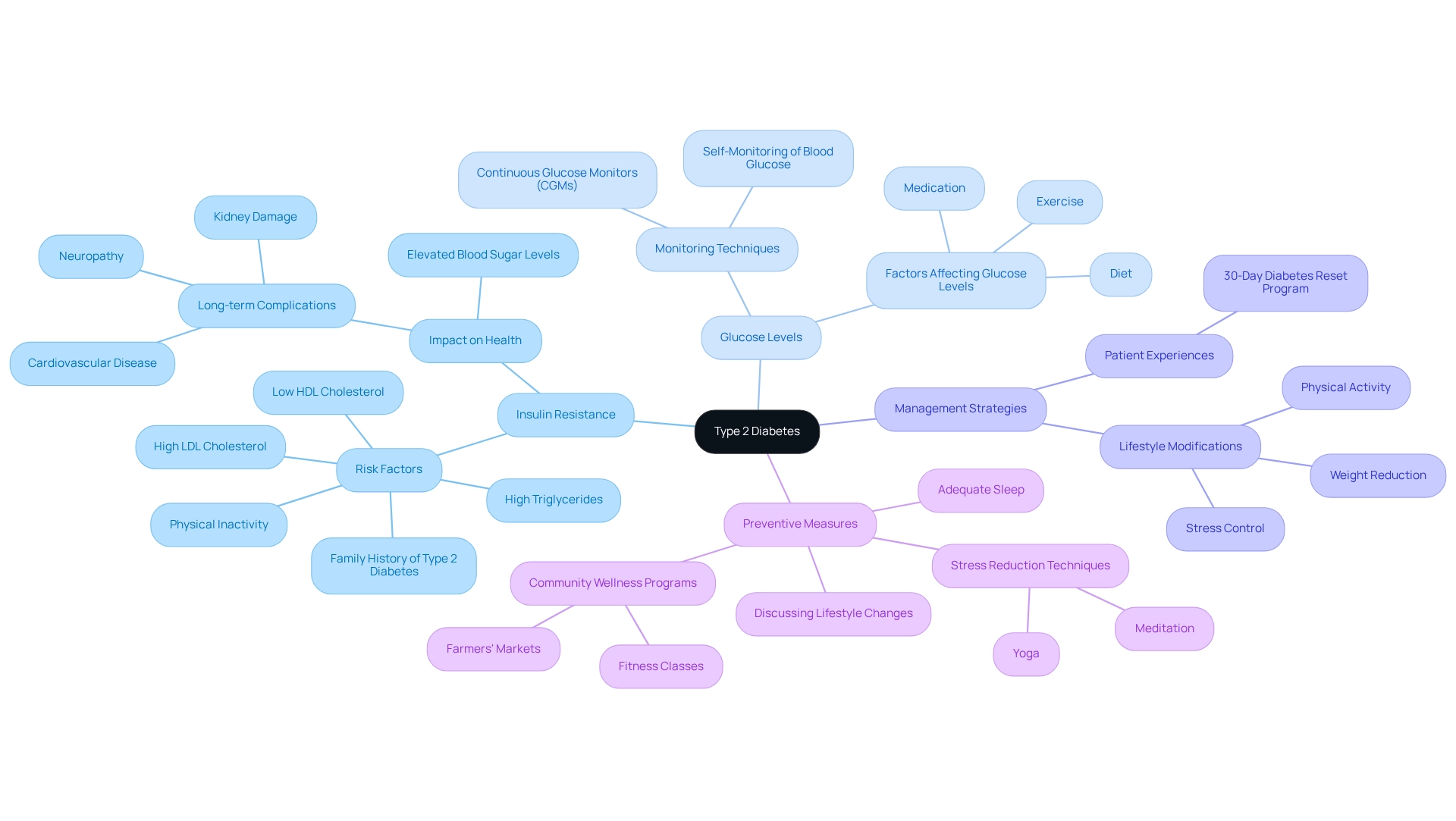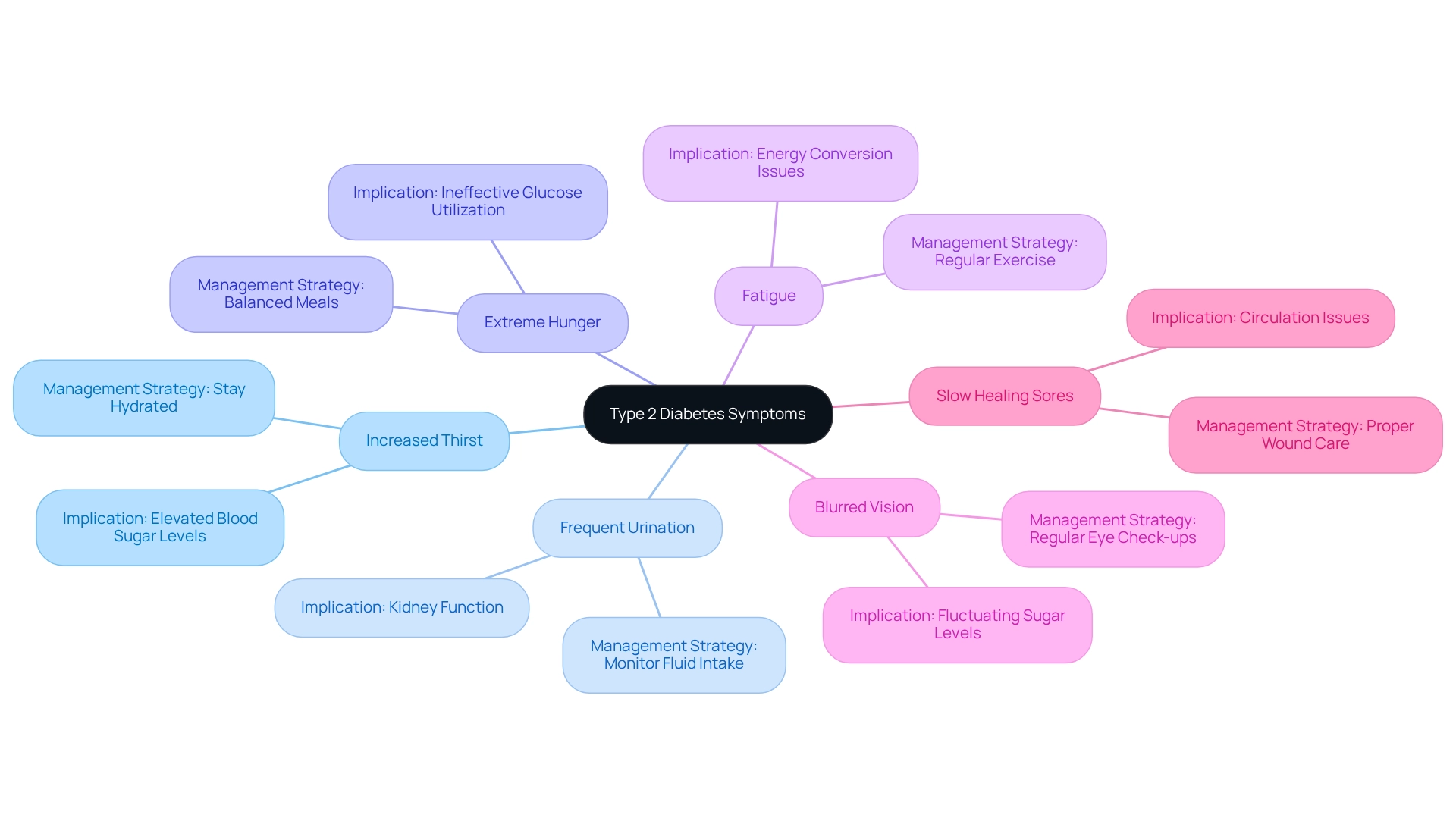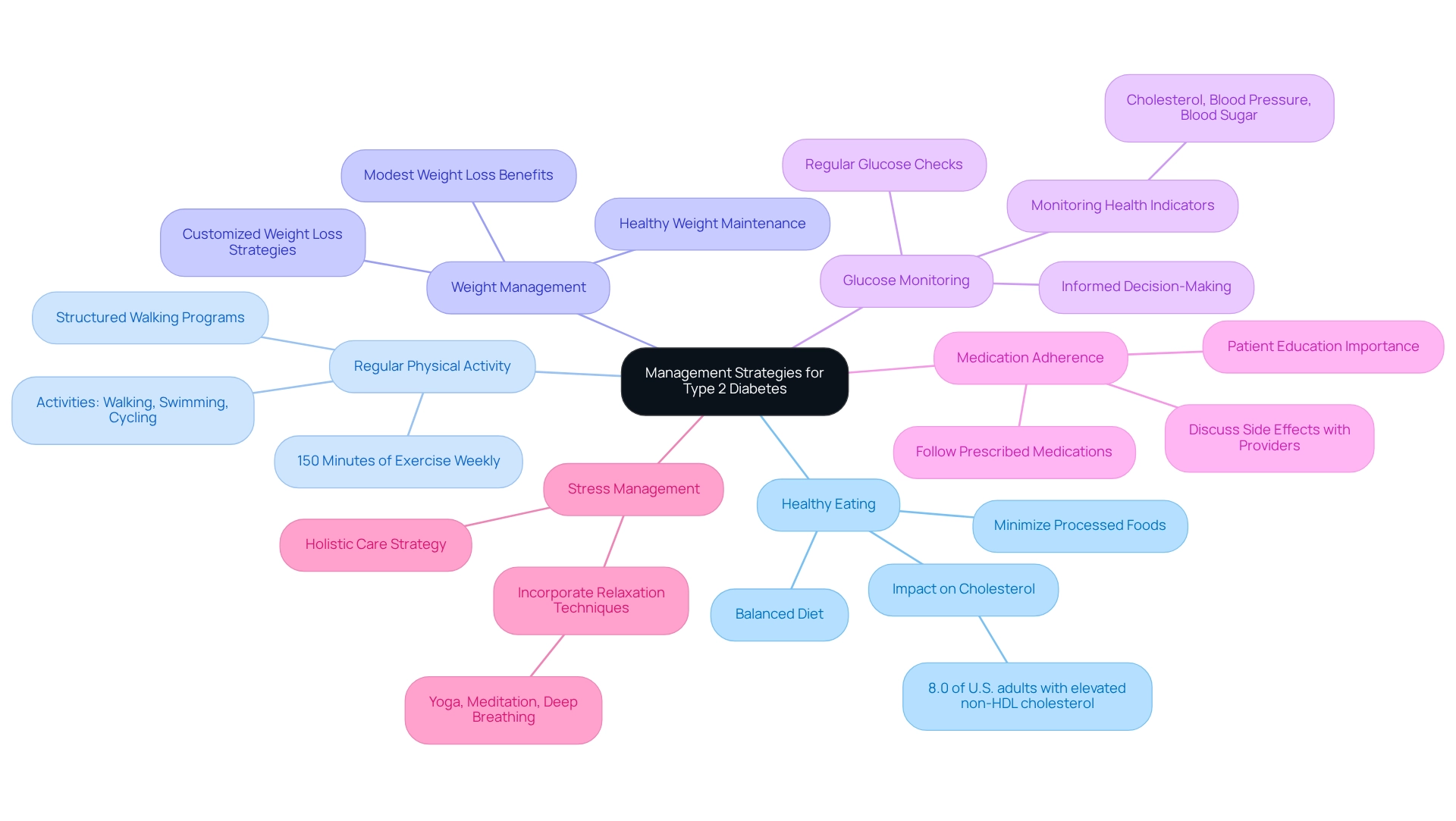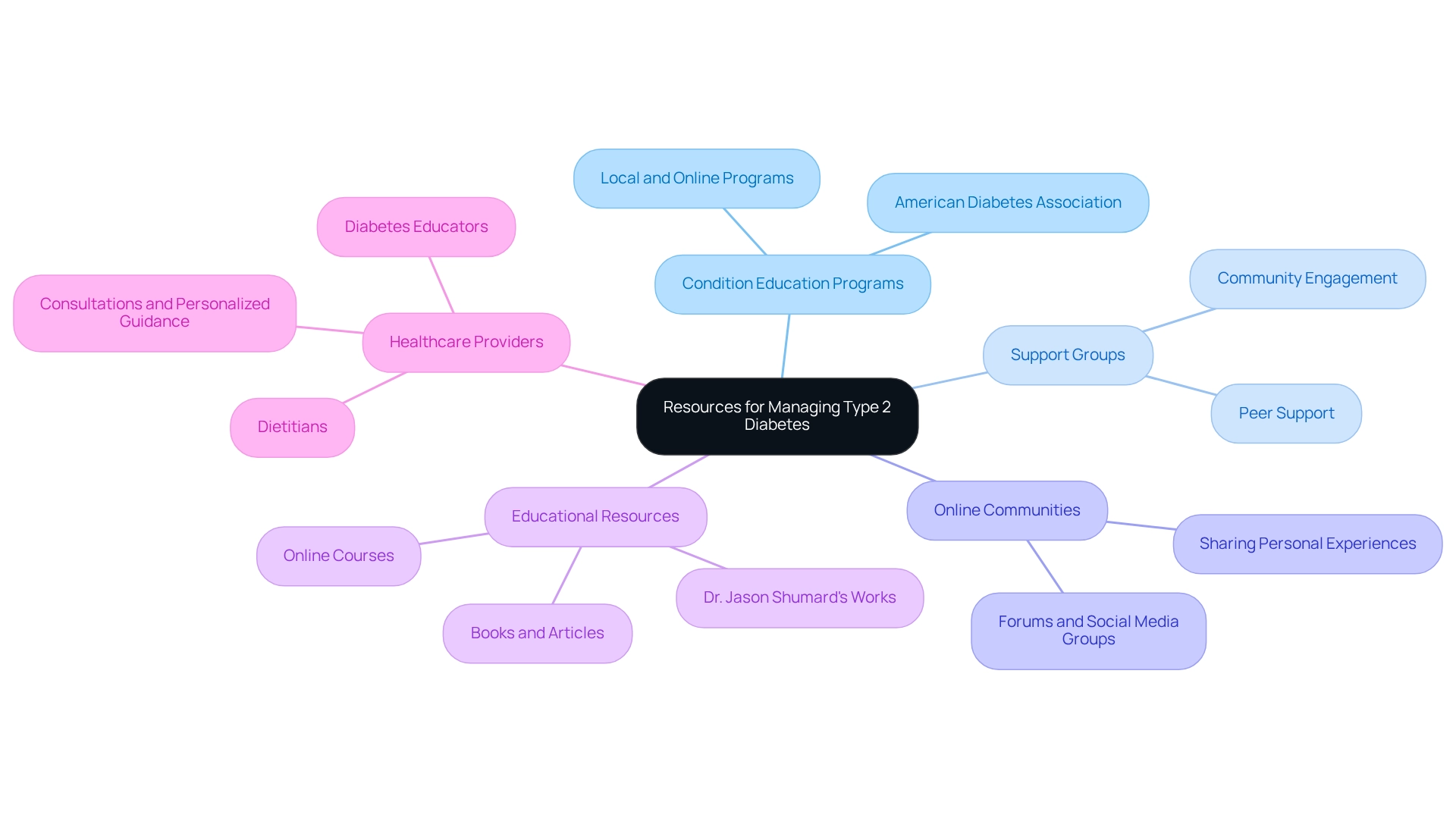Overview
Managing Type 2 diabetes can feel overwhelming, but there is hope. By embracing lifestyle changes such as:
- Healthy eating
- Regular physical activity
- Stress management
Along with diligent monitoring and medication adherence, you can take charge of your health. It’s important to recognize that understanding insulin resistance and being aware of symptoms can lead to timely interventions. Many patients find that personalized strategies, coupled with community support, significantly enhance their health outcomes and overall quality of life. Remember, you are not alone in this journey, and there are resources available to help you thrive.
Introduction
In the face of a growing diabetes epidemic, understanding and managing type 2 diabetes has never been more critical. Many individuals feel overwhelmed by this chronic condition, often rooted in lifestyle choices and genetic predispositions, presenting challenges that can significantly impact their quality of life.
It’s important to recognize that acknowledging early symptoms is the first step toward effective management. By implementing proactive strategies, individuals can navigate the complexities of diabetes with confidence.
With the right knowledge, support, and resources, you can take charge of your health, transforming your life and reducing the risk of severe complications.
This article delves into the essential aspects of type 2 diabetes, offering insights into its causes, symptoms, and effective management techniques that empower you to reclaim your well-being.
Understand the Basics of Type 2 Diabetes
To explain diabetes type 2, it is a chronic condition marked by insulin resistance, where the body struggles to utilize insulin effectively, leading to elevated blood sugar levels. This condition often develops gradually and is closely linked to obesity, a sedentary lifestyle, and genetic factors. It’s important to recognize that understanding insulin’s function and the complexities of glucose metabolism is vital to explain diabetes type 2. While there is no definitive cure, proactive management can lead to substantial health improvements and an enhanced quality of life. Let’s explore some key concepts together:
- Insulin Resistance: In this state, the body’s cells become less responsive to insulin, complicating efforts to lower blood sugar levels. To explain diabetes type 2, one must consider risk factors for developing insulin resistance, which include high triglycerides, elevated LDL cholesterol, low HDL cholesterol, a family history of type 2 conditions, and physical inactivity. Many patients find that engaging in regular outdoor activities, such as walking or hiking in the scenic parks of San Marcos, can significantly enhance insulin sensitivity and overall health.
- Glucose Levels: Regular monitoring of glucose is essential for understanding how various factors—such as diet, exercise, and medication—impact the management of the condition. Innovative tools like continuous glucose monitors (CGMs) can provide timely insights, allowing for more responsive adjustments in treatment. As Virginia Valentine, CNS, BC-ADM, CDE, notes, “Some worry about the lag time with CGM. But I say, 15 minutes of lag time with CGM is better than four hours of ‘lag time’ between tests with self-monitoring of blood glucose.”
To explain diabetes type 2, it’s important to note that if left unmanaged, this condition can lead to serious medical issues, including long-term complications such as cardiovascular disease, kidney damage, and neuropathy. Recent studies emphasize that lifestyle modifications, such as enhanced physical activity, weight reduction, and stress control, can greatly enhance insulin sensitivity and overall well-being. For instance, transformative patient experiences from Dr. Jason Shumard’s 30-Day Diabetes Reset program illustrate how personalized approaches can lead to remarkable wellness improvements, including significant weight loss and better blood sugar control.
Preventive measures to explain diabetes type 2 involve discussing lifestyle changes with patients. Incorporating stress reduction techniques, such as yoga or meditation, and ensuring adequate sleep are essential components of achieving health goals in controlling blood sugar. Community wellness programs in San Marcos, such as local farmers’ markets and fitness classes, provide invaluable support, offering resources and group motivation to help individuals integrate these healthy habits into their daily lives.
By grasping these foundational concepts and embracing a holistic lifestyle approach, individuals can better appreciate the significance of implementing proactive management strategies to control their condition effectively.
Identify Symptoms and Signs of Type 2 Diabetes
To foster better health outcomes, it is crucial to explain diabetes type 2 and recognize the common symptoms that can significantly impact daily life. Here are some signs to be aware of:
- Increased Thirst: A persistent urge to drink water often arises from elevated blood sugar levels, signaling the body’s attempt to manage excess glucose.
- Frequent Urination: You may notice a heightened need to urinate, especially at night, as your kidneys work to eliminate surplus sugar from your bloodstream.
- Extreme Hunger: Despite regular meals, many individuals feel an unrelenting hunger due to the body’s inability to effectively utilize glucose for energy.
- Fatigue: Chronic tiredness is common, stemming from the body’s struggle to convert food into usable energy.
- Blurred Vision: Fluctuating sugar levels can lead to temporary vision changes, affecting clarity and focus.
- Slow Healing Sores: Cuts and bruises may heal more slowly, indicating potential issues with circulation and overall blood flow.
Recognizing these symptoms early is crucial. It can lead to timely medical intervention and lifestyle adjustments. Did you know that early detection can greatly enhance management results, which is important to explain diabetes type 2 and lower the risk of complications linked to this condition? For instance, studies show that lifestyle changes, such as weight loss and increased physical activity, can help explain diabetes type 2 prevention in at-risk individuals.
Dr. Jason Shumard emphasizes, “By providing patients with actionable insights and practical tools, the center fosters an environment where individuals can regain their wellness and well-being.” Real-life examples highlight how patients who recognized these symptoms early were able to apply effective management strategies, ultimately regaining their well-being. Establishing SMART goals—specific, measurable, attainable, relevant, and time-bound—can greatly improve focus and motivation in managing health. For example, a patient might set a goal to walk 30 minutes a day, five days a week, or to reduce their A1C levels by 1% over three months. Regularly tracking progress through fitness apps, journals, or pedometers allows individuals to adapt their goals as their fitness levels change, fostering accountability and a sense of achievement.
It’s important to recognize that awareness regarding these signs can lead to better health outcomes and a reduced reliance on conventional medical treatments. Ignoring these symptoms can result in severe complications, underscoring the urgency of recognizing and addressing these signs early. Remember, you are not alone in this journey, and taking proactive steps can make a significant difference in your health.
Implement Effective Management Strategies for Type 2 Diabetes
To effectively manage type 2 diabetes, it’s important to consider the following strategies:
-
Healthy Eating: Emphasizing a balanced diet rich in whole foods—like vegetables, fruits, whole grains, and lean proteins—can be a game changer. Minimizing processed foods and sugars is essential. Did you know that 8.0% of U.S. adults with diagnosed conditions have elevated non-HDL cholesterol levels, which can be influenced by diet? Making these dietary changes can significantly lower cholesterol levels, improving overall health. Dr. Jason Shumard’s functional medicine approach seeks to explain diabetes type 2 by highlighting the importance of nutrition and offering tailored dietary plans that promote healing.
-
Regular Physical Activity: Aim for at least 150 minutes of moderate exercise weekly. Engaging in activities such as walking, swimming, or cycling not only helps reduce sugar levels but also enhances insulin sensitivity. Many patients find that structured walking programs lead to substantial health improvements. For those interested, a detailed guide on starting a walking program is available in our user manual.
-
Weight Management: Maintaining a healthy weight is vital for blood sugar control. To explain diabetes type 2, it’s important to note that even modest weight loss can lead to significant enhancements in its management. It’s crucial to adopt a customized strategy for weight loss. The Integrative Wellness Center offers personalized approaches to help patients effectively achieve their weight management goals.
-
Glucose Monitoring: Regularly checking glucose levels is essential for understanding how different foods and activities affect your body. This practice enables informed decision-making regarding diet and exercise. As highlighted in a case study, routine assessments of cholesterol, blood pressure, and sugar levels are key to preserving well-being and can help to explain diabetes type 2 risk.
-
Medication Adherence: If medications are prescribed, taking them as directed is important. Open discussions with healthcare providers about any concerns regarding side effects or effectiveness can optimize treatment outcomes. Dr. Shumard emphasizes the value of patient education to empower individuals in managing their medications effectively.
-
Stress Management: High stress levels can negatively impact blood sugar control. Incorporating relaxation techniques—such as yoga, meditation, or deep breathing exercises—can help alleviate stress and enhance overall well-being. The Integrative Wellness Center integrates stress reduction techniques into its holistic care strategy, recognizing their importance in addressing blood sugar issues.
As Dr. Jason Shumard states, “By providing patients with actionable insights and practical tools, the center fosters an environment where individuals can reclaim their well-being and vitality, ultimately leading to improved quality of life and reduced reliance on conventional medical interventions.”
Applying these strategies can help explain diabetes type 2 by leading to better management of blood sugar levels and an enhanced quality of life, empowering individuals to reclaim their health while reducing dependence on traditional medical treatments. It’s also crucial to recognize that uncontrolled blood sugar levels can lead to serious complications, such as vision issues, affecting 11.8% of U.S. adults with diagnosed blood sugar conditions in 2019.
Contact Us Today: To learn more about how the Integrative Wellness Center can assist you in managing your condition effectively, please call us at (858) 564-7081 or visit our website to register for our upcoming events.
Access Resources and Support for Ongoing Education
To enhance your journey in overseeing your condition, it’s important to recognize that various resources can provide invaluable support:
-
Condition Education Programs: Have you considered seeking out local or online programs that offer comprehensive education on managing your condition? Organizations like the American Diabetes Association provide valuable resources that empower you with essential knowledge and skills. Effective education programs can lead to improved health outcomes and better management of your illness, aligning perfectly with our transformative approach to care at Integrative Wellness Center.
-
Support Groups: Many patients find that joining a support group for individuals with this condition can be instrumental. These groups offer emotional support and practical advice from peers who truly understand the daily challenges of living with it. By fostering a sense of community and shared experience, support groups significantly enhance motivation and resilience. The benefits extend beyond emotional assistance; they often lead to improved adherence to care plans, which is crucial for effective control of your condition.
-
Online Communities: Engaging in online forums and social media groups focused on managing your illness can also be beneficial. These platforms not only provide support but also allow for the sharing of personal experiences and strategies that can assist in effective oversight. Connecting with others can offer fresh perspectives on comprehensive lifestyle approaches that emphasize nutrition, exercise, and stress reduction.
-
Educational Resources: Have you explored books, articles, and online courses dedicated to managing blood sugar? Works by Dr. Jason Shumard serve as outstanding materials for understanding both blood sugar conditions and thyroid health, equipping you with practical knowledge. His educational approach has empowered many patients, leading to significant advancements in their wellness oversight and highlighting the effectiveness of tailored support.
-
Healthcare Providers: Regular consultations with medical professionals, including dietitians and educators specializing in blood sugar control, are essential. They can offer personalized guidance and help adapt your management plan to your evolving needs. Recent discussions surrounding changes to reimbursement policies for diabetes education clinics underscore the importance of seeking financial support for these vital services.
By actively engaging with these resources, you can remain informed, motivated, and supported on your journey to effectively manage type 2 diabetes, which helps to explain diabetes type 2 and embrace a holistic approach to your health.
Conclusion
Understanding and managing type 2 diabetes is essential for improving your quality of life and reducing the risk of serious health complications. It’s important to recognize that this journey can be challenging, but you are not alone. This article has explored foundational concepts of the condition, such as insulin resistance and the importance of monitoring blood sugar levels. By acknowledging early symptoms like increased thirst, frequent urination, and extreme fatigue, you can seek timely intervention and effective management.
Many patients find that implementing proactive strategies—such as maintaining a healthy diet, engaging in regular physical activity, and managing stress—can significantly enhance diabetes management. Even modest lifestyle changes can lead to substantial improvements in health. It’s crucial to adopt personalized approaches tailored to your individual needs. Resources like diabetes education programs and support groups play a vital role in providing ongoing education and community support, empowering you to take charge of your health.
By embracing these strategies and accessing available resources, you can navigate the complexities of type 2 diabetes with confidence. Taking charge of your personal health not only leads to better management of the condition but also fosters a sense of empowerment and well-being. Remember, with the right knowledge, support, and proactive measures, transforming your health and lifestyle is entirely achievable. You have the strength to make these changes, and every step you take is a step towards a healthier future.
Frequently Asked Questions
What is diabetes type 2?
Diabetes type 2 is a chronic condition characterized by insulin resistance, where the body struggles to use insulin effectively, leading to elevated blood sugar levels. It often develops gradually and is associated with obesity, a sedentary lifestyle, and genetic factors.
What is insulin resistance?
Insulin resistance is a state where the body’s cells become less responsive to insulin, making it difficult to lower blood sugar levels. Risk factors include high triglycerides, elevated LDL cholesterol, low HDL cholesterol, family history of type 2 conditions, and physical inactivity.
How can lifestyle changes impact diabetes type 2?
Lifestyle modifications, such as increased physical activity, weight reduction, and stress management, can significantly improve insulin sensitivity and overall health. Regular outdoor activities like walking or hiking can enhance these effects.
Why is monitoring glucose levels important?
Regular monitoring of glucose levels is crucial for understanding how diet, exercise, and medication affect diabetes management. Continuous glucose monitors (CGMs) provide timely insights, allowing for more responsive treatment adjustments.
What are the potential complications of unmanaged diabetes type 2?
If left unmanaged, diabetes type 2 can lead to serious complications, including cardiovascular disease, kidney damage, and neuropathy.
What preventive measures can help manage diabetes type 2?
Preventive measures include discussing lifestyle changes with patients, incorporating stress reduction techniques like yoga or meditation, ensuring adequate sleep, and engaging in community wellness programs that promote healthy habits.
How can community resources support individuals with diabetes type 2?
Community resources, such as local farmers’ markets and fitness classes, provide support and motivation for individuals to integrate healthy habits into their daily lives, enhancing their ability to manage diabetes effectively.



